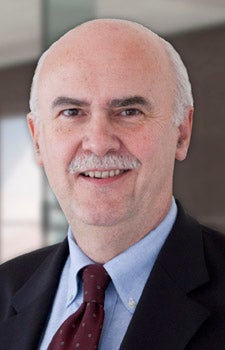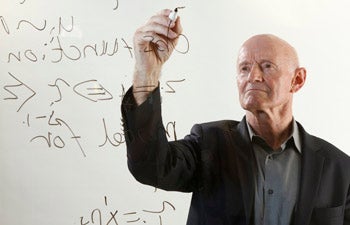An Objective Analysis
The USC Dornsife Center for Economic and Social Research (CESR) has opened a new space in the building with USC Information Sciences Institute’s office in Arlington, Va.
Opened May 28, the Development Portfolio Management Group (DPMG) helps clients throughout the world get expected results from their economic development investments.
For instance, if you are a funder, how can you ensure your funding will be effective? How can you identify and address the risks?
If you are a developing country, or an organization undertaking a development project, what assurances can you give to funders that their investments will achieve the desired results?
Addressing these questions, the group was previously attached to the RAND Corporation, a nonprofit global policy think tank based in Santa Monica, Calif. Xavier Legrain, DPMG’s executive director, said he decided to follow Arie Kapteyn, formerly senior economist and director of RAND Labor and Population, to USC Dornsife.
After arriving in November 2012, Professor of Economics Kapteyn established CESR, which conducts basic and applied research in economics and the social sciences in many fields, disciplines, topics and methodologies.
One of CESR’s research areas includes financial decision-making with the goal of improving the understanding of how people reach decisions affecting their economic status, particularly in old age. Another seeks a deeper understanding of health disparities with regard to socio-economic status. CESR researches how racial and ethnic minority groups, geographic locations, genders, age groups and disabilities affect an individual’s health and income. The center also studies the science of happiness.
Kapteyn said CESR seeks to conduct exciting, interdisciplinary research with a global reach.
“DPMG is a perfect fit for us,” Kapteyn said. “I have worked with Xavier since he moved his group from the World Bank to RAND and have been deeply impressed by his professionalism and dedication. Having DPMG joining CESR is a major step toward fulfilling our ambitions.”

DPMG’s executive director is Xavier Legrain, a senior global executive with extensive experience in many sectors of economic development in developing countries including Africa, Europe, the Middle East, North Africa and South Asia. Photo by Carol Earnest.
Legrain said the creation of CESR compelled him to move his group to USC Dornsife.
“We looked at several institutions interested in our group,” Legrain said. “We thought USC was the best choice.”
Legrain and his group worked well with Kapteyn at RAND.
“We like his style,” Legrain said. “He’s an excellent manager. He’s open-minded and has a flexible approach, which is important with what we do. And he has a top-notch team.”
USC Dornsife Dean Steve Kay noted DPMG’s international reach.
“We are excited about DPMG joining our Center for Economic and Social Research,” Kay said. “Their presence in Washington D.C. and the international development work they do is another example of the global reach of our USC Dornsife faculty and their research programs.”
The concept behind DPMG originated in 1997 when the World Bank created the Quality Assurance Group to improve the performance of the bank’s portfolio. About two of every five closed loans were failing to achieve their objectives. Traditional tools, such as self-reporting or ex-post-facto evaluations, were unsuccessful in monitoring or predicting portfolio performance.
Many development organizations are today struggling with the same issues faced by the World Bank in 1997. Headed by Legrain, who was the former Director of the World Bank’s Quality Assurance Group, DPMG was created in January 2012 at the RAND Corporation.
Legrain’s group assesses the performance of whole portfolios or subsets of special interest through mid-term or ex-post evaluations. Subsets could be a region, a country, a time period or those defined as “problem projects.”
DPMG works for countries throughout the world, pulling from their pool of more than 1,000 experts who speak nearly all languages. Its primary focus is to diagnose the likelihood that projects will succeed before they close. The group is often called in to “rescue” projects in trouble and identify specific measures to get them back on track.

DPMG followed Professor of Economics Arie Kapteyn (pictured here), formerly senior economist and director of RAND Labor and Population, to USC Dornsife. Photo by Roger Snider.
The group also works with clients to identify institutional bottlenecks that prevent the achievement of development results and conducts comprehensive assessments of the institutional effectiveness of development organizations.
For example, the group recently assessed the performance of the Arab Administration Development Organization (ARADO), a nonprofit organization affiliated with the League of Arab States founded in 1961 to promote and advance administrative development in the Arab region.
In five visits to Sudan, Jordan, Egypt, Saudi Arabia and Kuwait, DPMG conducted more than 100 in-depth interviews with ARADO’s relevant managers and staff.
Another recent DPMG study examined the use of evaluations in the Norwegian Development Cooperation System. DPMG examined whether the use of evaluations in Norwegian aid led to anything productive. DPMG researched departments and units responsible for the management of aid in the Ministry of Foreign Affairs and in the Norwegian Agency for Development Cooperation (Norad). DPMG researchers assessed Norway’s current evaluation follow-up system, focusing on the effectiveness of evaluations.
The group’s 108-page report was based on in-depth interviews, case studies, document reviews and questionnaires with 230 key people across Norad, the Ministry of Foreign Affairs and embassies.
Overseeing all of the projects is Legrain, a senior global executive with extensive experience in many sectors of economic development in developing countries including Africa, Europe, the Middle East, North Africa and South Asia. He acquired his expertise in portfolio management, evaluation and quality assurance during a career of 31 years at the World Bank. His group’s mandate was to help the bank manage its $150 billion portfolio of economic development investments throughout the world.
“USC has a great reputation,” Legrain said. “It’s good to have that kind of support structure behind us.”